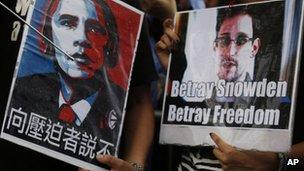Chinese unsurprised by Edward Snowden leaks
- Published
- comments

Supporters of Edward Snowden protest in front of the US consulate in Hong Kong earlier in June
Edward Snowden has accused President Barack Obama of "political aggression", earning him the headline from NBC, external: "Snowden rants against Obama".
That may be how it looks in America, but it is not how this case will be seen in much of the rest of the world. I am just back from China, where I've been making a documentary on US-China relations (more on that nearer transmission).
The Chinese equivalent of Twitter, Weibo, was full of chatter about the case.
Jia Xiu Dong from the China Institute of Foreign Studies, the Chinese foreign ministry's think tank, showed me some of the comments after Mr Snowden was allowed to leave Hong Kong.
The general impression was that if this was a setback for relations with the US, then "so what?". Many think that the US, keen to lecture others, is getting a taste of its own medicine.
Of course most countries would show a degree of urgency in pursuing someone who is giving away their secrets, but the subject of Snowden's leak is important too. The US has long accused China of cyber-spying, and now it's clear the US is the world's leading cyber-snooper.
No-one I met in China was particularly surprised - "spies spy" was one comment - but there's a mood of wry amusement that America has been caught with its ear to the door.
Mr Obama has dutifully explained that what goes on is little more than identifying traffic: the example he used was tracking who Bin Laden rang on his mobile phone and then finding who they contacted.
The subtlety will be lost on many, but Mr Snowden's suggestion that Mr Obama represents old politics, business as usual, will find a cynical and receptive audience.